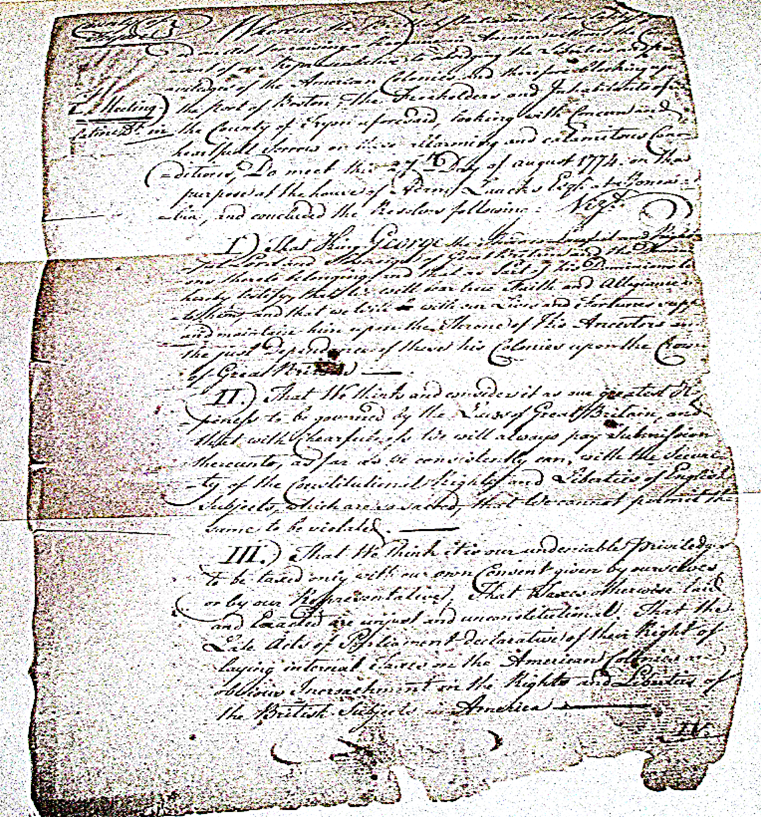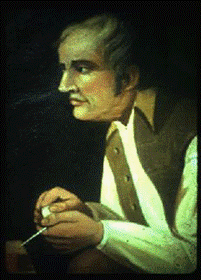The fact the Sir William Johnson and his extended family controlled the political and military life of Tryon County, and were all loyal to the British crown, meant there was little chance that any large, open opposition to British policies would occur within the county. In addition to this however, many in Tryon County, like Edward Wall, had both directly and indirectly benefitted from Johnson’s patronage, so even if they disagreed with the British government, they respected Sir William and what he had done for them and for the advancement of Tryon County. With Sir William’s death in July of 1774, however, all that would change. Johnson’s son, Sir John, and nephew and successor in the Indian department, Guy, had always stayed more aloof and had not established the sort of close ties with the older, established families in the county as Sir William had done. Consequently, many would-be rebels, who had stated quiet out of respect for Sir William, felt no need to extend the same sort of courtesy to his heirs.
On August 27 of 1774. The Committee of Safety for the Palatine District of Tryon County met openly to condemn the policies of the British government, and to voice their support for the meeting of the First Continental Congress. They also agreed to abide by any resolves approved of by the congress. The committee members apologized to the committees of Albany County and New York City, for their late start, stating “This County has for a series of Years been Ruled by one family, the different Branches of which are still strenuous in dissuading people from coming into Congressional Measures…” Even with this initial start however, it would not be until May of 1775 that the Palatine Committee would meet again. By this time, the first shots of the American Revolution had been fired at Lexington and Concord and the various committees of safety throughout the 13 colonies then moved forward to take control of their local governments as the power and authority of the royal governors and legislatures slipped away. It is at this point that Edward Wall steps out of the shadows to once again put his mark on Mohawk Valley history.
In the minutes of the first combined meeting of all the Committees of Safety of Tryon County on May 24, 1775, Edward Wall’s name is recorded as a “Member Present” from German Flatts. It is also recorded that “Mr. Wall laid before the Body the proceedings of the Gremanflatts and King’sland Districts unitedly...” What led to Wall’s decision to become an active member of the rebel party is completely unknown. Perhaps the loss of his patronage network had given Wall cause for concern. Sir William Johnson was long dead, and his first patron, John Butler, had fled Butlersbury for Canada earlier in the month along with his eldest son Walter. Indian Superintendent Guy Johnson would follow the Butlers in June. Perhaps Wall thought it best to gain favor with those who were now assuming the mantle of government in the county. It is possible that Wall is one of those who had opposed British policies, but out of respect for the Johnsons and Butlers, had kept quiet. Whatever the case, it was also obvious that members of the other committees were impressed with Wall’s work on behalf of the rebel cause. Wrapping up their final business, the committees resolved “that four members of this body be sent down to commune with the Committees of Albany and Schenectady upon the present situation of America in general and this County in particular, to obtain all the intelligence possible, and to buy such a quantity of powder and flints and lead as they judge necessary...” Edward Wall was one of the four chosen to carry out this important mission of collaboration with other area committees, and to purchase vital military supplies.
Perhaps Wall’s combined experiences as a school master, fur trader and merchant had given him the skills to work well with people of all ages and backgrounds, or perhaps his record of reliable and responsible work (and having a successful business) had led to him gaining a measure of respect among the leading rebel families, as it had apparently done with the Johnsons and Butlers. His being in a Masonic Lodge would have given him some standing as well. Once again, we can only speculate on the traits that Wall possessed that led the combined Committees of Safety of Tryon County to continue to entrust him with important duties.
On June 2, 1775, the combined committees drafted a letter to Superintendent of Indian Affairs Guy Johnson, the gist of which was requiring him to state whether he stood with the crown or with the rebels, and what his intentions were concerning the Indian nations he worked with. They also insisted that he allow a delegation of committee members to attend the upcoming conference he had called for with the Six Nations Indians. It was ordered “that Edward Wall, Peter Waggoner, Nicholas Herkhimer, Adam Fonda and Frederick Fox be a Committee to wait upon Guy Johnson Esq. to deliver the same letter and request his answer and ask him, when to wait on him for his answer…” Once again, Wall was part of a group charged with a very important and sensitive duty. It was in fact Wall and Herkimer who personally delivered the letter to Johnson. Between delivering the letter on June 3 and the next meeting of the German Flatts committee on June 17, however, something occurred which led to Wall ending his association with the committees of safety.
IMAGE BELOW: The first page of the Minute Book of The Tryon County Committee of Safety, 1774

We have only the abstract of a letter in the Johnson Papers to give us any indication of what may have caused Edward Wall to question the true motives of the committees of safety and his role within them. The abstract reads thus: "Edward Wall, German Flats, June 8, to Christopher P. Yates, declaring he can no longer act on the Committee unless its resolutions are to be respected by all the members of the association." We know of two early resolves of the Palatine Committee that were almost certainly adopted by the other committees as well. One stated that committee business could not be discussed with anyone outside of the committees. The other stated that no one was to conduct business with any person who had not signed the “association” pledging to support the Continental and Provincial Congresses and to abide by their resolves. It is not hard to imagine some committee members, now possessed of a power they had never known before, wanting to show that they were “in the know” and build up their egos and reputations by sharing committee information with friends and family.
The situation of some businessmen continuing to secretly carry on that business with those now considered enemies is one of those many timeless aspects of war. Either of these situations would cause concern for a man who had by allappearances, always strictly followed “the laws of the land”,and had become a successful businessman by hard, honestwork. There was no doubt also some men who were now using their new positions of power to carry out personal vendettasagainst any who were tied to the old Johnson power base.The fact that Wall owed much of his position in life to theJohnson-Butler families, and was married to John Butler’sniece would have made these personal vendettas difficult to accept. Hand in hand with all of this, the committees were now reorganizing the Tryon County Militia under leaders supporting the rebellion again England. Wall may have been like many initial rebels, who supported political action against what they considered unjust laws forced on them by the British government but were not ready to take up arms and fight against their Mother Country. Many early rebels truly expected that a reconciliation with England would take place before a true war broke out. Again, we can only speculate on the combination of issues that brough on Wall’s “crisis of conscience” and led him to decide that he could no longer actively follow the rebel cause. Whatever combinationof factors that it was, on June 17, 1775, it was recorded in the meeting minutes of the German Flatts-King’s land district that “Mr. Edward Wall, a member of the German flatts Committee, begged to be excused in serving any longer in that office and for sufficient Reason it was Ordered that he shall be discharged.”
IMAGE BELOW: A posthumous portrait of Nicholas Herkimer based on period descriptions.

We will also never know what “sufficient Reason” Wall gave to the committee so that they were willing to discharge him with no apparent trace of doubt or suspicion following him. Wall had signed the “Association” to abide by congressional resolves and perhaps this, in combination with the active work he had done in the rebel cause early on, led the committees to believe that Wall would remain a tacit supporter of the rebellion, assisting in the background however he could. If this was the case, the committee members were in for a rude awakening in the coming years. For the remainder of 1775 and into 1776, however, it appears that Wall simply returned to his private life and business, and if he did nothing to support the rebellion, he apparently also did nothing (at least openly) to thwart it. There is also the fact that the war itself had not yet truly touched the Mohawk Valley, and those living there had not yet been forced into a situation where they must once and for all openly choose a side. All that would change in 1777.
Check out the next blog post to continue the story!
